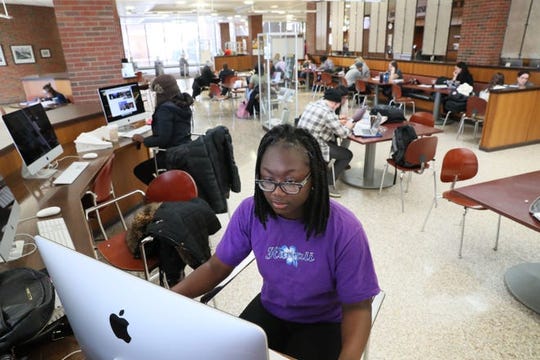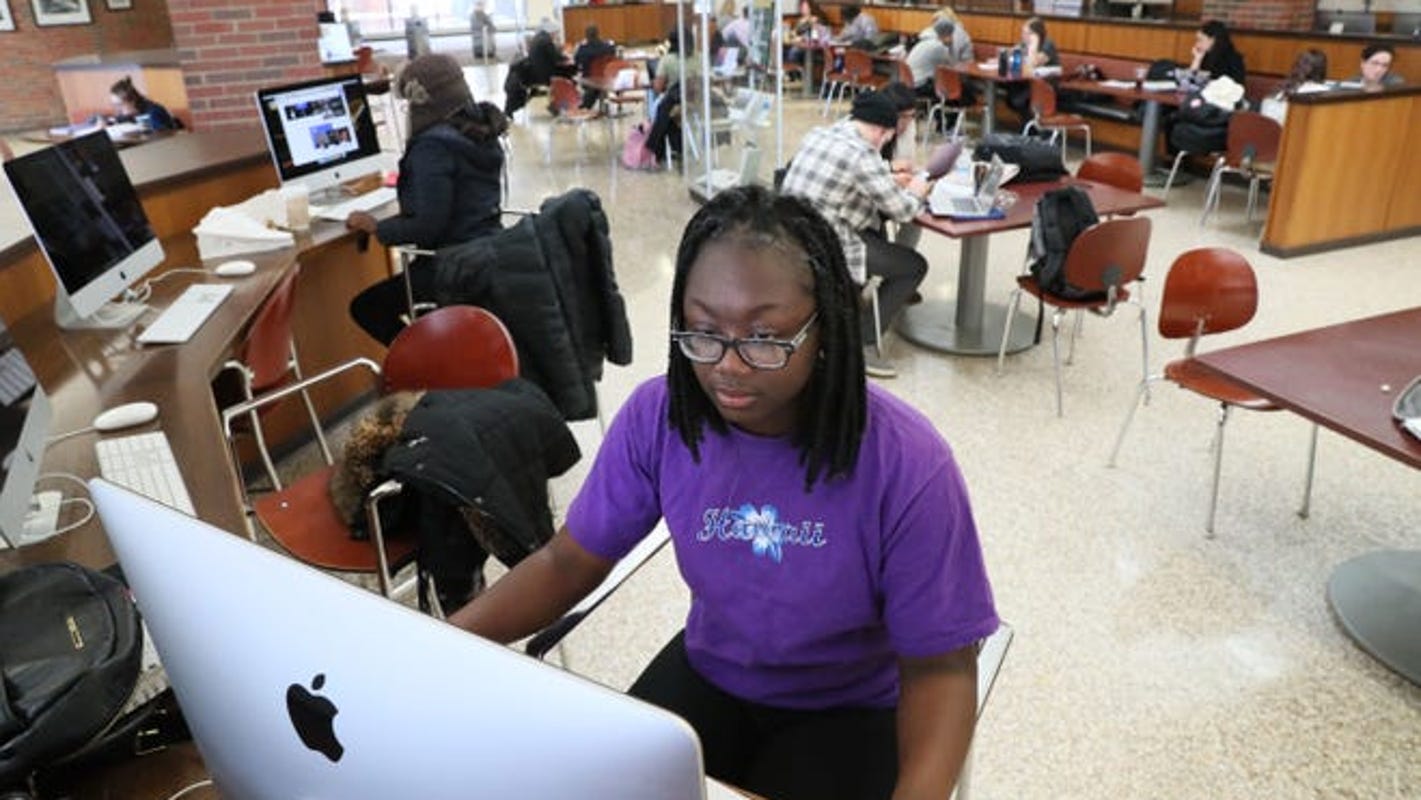 Buy Photo
Buy Photo
Sh’Tejah Ward works in the Golda Meir Library at UWM. (Photo: Michael Sears / Milwaukee Journal Sentinel)
Four southeast Wisconsin colleges have become the first in the country to form an alliance intended to eliminate the college equity gaps that have existed in the region for generations.
Leaders at the University of Wisconsin-Milwaukee, UW-Parkside, Milwaukee Area Technical College and Carthage College announced Wednesday they had signed on to the Moon Shot for Equity, a national effort led by Washington D.C.-based education firm EAB.
The up-to-10-year effort calls for re-imagining much of the college experience — including admissions, academic advising and curriculum — with the goal of reducing the barriers known to disproportionately hold back students of color, those who are the first in their families to go to college and those from low-income backgrounds.
The schools are the first to take a regional approach to the Moon Shot challenge. And campus leaders say the region and their campuses need it.
In the seven-county Milwaukee region, 56% of white students earned a degree or a certificate within six years. Only 32% of Hispanic students and 20% of Black students did the same, according to data from the Higher Education Regional Alliance, a group of southeast Wisconsin colleges that includes the four taking on the Moon Shot.
Wisconsin is “dead last” in the U.S. for its high school equity gap for Black students and ranked in the bottom seven for the gap Hispanic students face, UWM Chancellor Mark Mone said.
Those challenges persist into college, where students who are struggling with issues of acceptance, finances and the experience of navigating college for the first time are taking longer, more expensive paths to graduation, if not giving up on college altogether.
“If we just say, ‘Oh, it’s all about the money or it’s all about how did your K-12 prepare you, that’s a cop out,’ ” he said. “It’s not acknowledging that we have opportunities, and frankly, an obligation, to do more to look at what are we doing to support and enable students to succeed at UWM and across all of higher ed.”
Students drop out because they can’t pay their bills, fall behind because they can’t pass a remedial math class, or give up on enrollment because they don’t know how to fill out complex financial aid forms. Others lose earned college credits and money because their classes don’t transfer between institutions. Seemingly small issues — missed advising sessions, classes and assignments — lead to them falling behind on graduation.
The Moon Shot will bring about $8 million in investment from EAB and the four Wisconsin colleges for at least five years. The colleges will also seek out philanthropic support and partnerships with local employers.
The money could fund new scholarships or grants aimed at keeping students from dropping out, surveys that help leaders understand the experiences of students of color on campus and audits of admissions and other university processes.
EAB’s portion of the $8 million will come in the form of services including training, advising and technology, like the firm’s online counseling tool, Navigate, which allows colleges to track student data and predict who is at risk of dropping out.
The collaboration builds on efforts that were already happening on each campus, including work at Carthage to make it easier for students to navigate financial aid and paying for college, at UWM and UW-Parkside to better advise students who are at risk of dropping out, and at MATC to make it easier to transfer credits and to give students who dropped out a second chance to enroll.
RELATED: Want to graduate on time and save money? Make sure you take 15 credits a semester.
RELATED: In the world of big data, UW schools see a chance to predict who will struggle—and help early
The colleges will share data on what works, what doesn’t, collaborate between staffs and hold each other accountable.
Pandemic increased urgency
The launch comes at a time when colleges face the financial and health issues brought on by the COVID-19 pandemic and an uncertain future. But the pandemic and national reckoning over racial inequality are evidence that colleges must work harder to better support students of color, leaders said.
“I really felt we couldn’t wait,” MATC President Vicki Martin said. “And I know that many schools were looking at it and saying that during COVID, it’s probably not the best time. But I think what it really demonstrated to me, with health disparities (faced by people of color) on top of all the other issues that are facing our students and our community, there is no better time.”
RELATED: A new MATC scholarship program wipes out the debt of students who dropped out and gives them a second chance to graduate
RELATED: Carthage College slashes tuition sticker price, saying it ‘just didn’t make any more sense’
MATC’s Martin and UW-Parkside Chancellor Deborah Ford lead the Higher Education Regional Alliance’s work on ensuring higher college completion rates in southeast Wisconsin.
“We’re looking at the data by race and ethnicity and we have to make stronger gains for those who have been underrepresented in achieving a college degree,” Ford said.
John Swallow, president of Carthage College, said he hopes the Moon Shot helps his college address the fact that more Hispanic and Black students drop out after freshman year than white students.
He said he once believed that equity gaps could be lessened, but not eliminated entirely because of how early in K-12 education students were falling behind. Then he heard an administrator from Georgia State University tell a room of Wisconsin educators that race and ethnicity were no longer predictors of success on their campus.
“I almost fell out of my chair,” he said. “I didn’t think that was possible.”
Policies embedded for generations
Kellie Sigh, executive director of the nonprofit College Possible Milwaukee, applauded the news as a “fabulous first step.”
The issues that create the “degree divide” are long-standing, Sigh said, from the heavy reliance on standardized test scores in admissions to student advising that stacks difficult courses to penalties and holds for small outstanding bills.
“We’re talking about policies and practices that have been embedded into institutions of higher ed for literally hundreds of years,” she said. “It’s going to take a lot of time to root those out.”
Tom Sugar and LaToya White, who lead the Moon Shot initiative for EAB, said it’s the effort that those involved are willing to stake their reputations on.
“Equity gaps and achievement gaps, they’ve kind of been like that for a long time. A problem we’ve sort of admired. Headlines we’ve stopped reading,” Sugar said. “Now we know how we do it. Now it’s simply a question of will and courage.”
Contact Devi Shastri at 414-224-2193 or DAShastri@jrn.com. Follow her on Twitter at @DeviShastri.
Read or Share this story: https://www.jsonline.com/story/news/education/2020/10/21/uwm-uw-parkside-carthage-college-matc-join-forces-racial-equity/3680647001/
Credit: Source link

